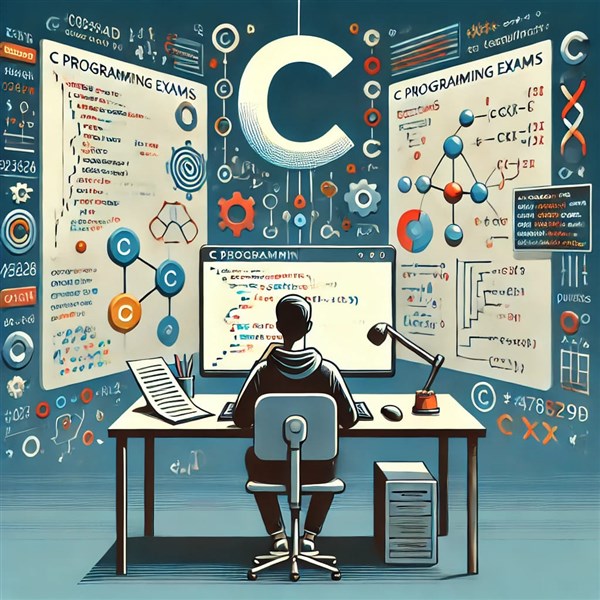Unable to find what you're searching for?
We're here to help you find it
C remains one of the most powerful, efficient, and foundational programming languages in the tech world. Whether you're diving into embedded systems, systems programming, operating systems, or learning the fundamentals of programming, C is a must-know language. That’s why many computer science students and professionals pursue C language certification to validate their skills and enhance their career prospects.
However, passing a C programming exam—whether it's for university credit or industry certification—can be tricky. Despite its simplicity, C has a lot of nuances that can trip up even experienced coders.
In this article, we’ll walk you through the most common mistakes to avoid in C programming exams, along with tips and best practices to help you ace your test with confidence.
❌ Common Mistake:
Treating C like a high-level language and ignoring manual memory management.
✅ What to Do Instead:
Understand the difference between stack and heap memory, and know when to use each. Learn how to:
💡 Tip: Use tools like Valgrind to practice detecting memory leaks in your own code before the exam.
❌ Common Mistake:
Writing code like if (a = 5) instead of if (a == 5).
This will assign 5 to a, which is always "true" in an if condition—leading to unintended behavior.
✅ What to Do Instead:
Be vigilant with comparison vs assignment. Use:
c
CopyEdit
if (a == 5) // Correct
💡 Bonus Tip: Some developers reverse the comparison to avoid mistakes:
c
CopyEdit
if (5 == a) // If accidentally written as 5 = a, it throws a compile-time error.
❌ Common Mistake:
Calling functions like printf() or malloc() without including the appropriate headers.
✅ What to Do Instead:
Always include the standard headers at the top of your program:
c
CopyEdit
#include <stdio.h>
#include <stdlib.h>
#include <string.h>
🧠 In exams, especially when you’re writing on paper or in an online IDE, missing a header file can cause compilation errors.
❌ Common Mistake:
Misunderstanding how to declare, dereference, and manipulate pointers.
Examples include:
✅ What to Do Instead:
Practice these concepts thoroughly:
💡 Tip: Use diagrams or visualize memory layout to really understand how pointers work.
❌ Common Mistake:
Using variables before initializing them, especially local variables.
In C, local variables are not automatically initialized to 0, unlike in some other languages.
✅ What to Do Instead:
Explicitly initialize variables when declaring them:
c
CopyEdit
int x = 0;
Uninitialized variables can lead to undefined behavior, which can cost you marks.
❌ Common Mistake:
Looping through arrays incorrectly and accessing out-of-bounds elements.
Example:
c
CopyEdit
for (int i = 0; i <= 10; i++) // Incorrect for an array of size 10
✅ What to Do Instead:
Use < instead of <= when dealing with arrays:
c
CopyEdit
for (int i = 0; i < 10; i++) // Correct
🧠 Array indexing in C starts at 0, so always double-check your loop bounds.
❌ Common Mistake:
Calling functions without checking their return values—especially for functions like malloc(), fopen(), or scanf().
✅ What to Do Instead:
Always validate function return values:
c
CopyEdit
FILE *fp = fopen("data.txt", "r");
if (fp == NULL) {
printf("Failed to open file\n");
}
🔐 In security-sensitive code, never assume a function succeeds unless you’ve verified it.
❌ Common Mistake:
Using gets() (deprecated and unsafe) or incorrect scanf() format specifiers.
Example of scanf() error:
c
CopyEdit
int x;
scanf("%d", x); // Missing & operator — causes runtime error
✅ What to Do Instead:
Use:
c
CopyEdit
scanf("%d", &x); // Correct
Avoid gets() entirely; use fgets() instead for safer input handling.
❌ Common Mistake:
Writing complex expressions without understanding how operators are evaluated.
Example:
c
CopyEdit
int x = 10;
int y = 5;
int z = x + y * 2; // y is multiplied first
✅ What to Do Instead:
Use parentheses to clarify intent:
c
CopyEdit
int z = (x + y) * 2;
🧠 Knowing operator precedence avoids unexpected results and bugs in logic-heavy code.
❌ Common Mistake:
Writing large chunks of code without compiling and testing regularly.
✅ What to Do Instead:
Follow the habit of writing and compiling code incrementally. In exams, if you're using an IDE or online judge, test logic in parts to isolate errors quickly.
If you're working with multiple .h and .c files in larger certification projects:
❌ Common Mistake:
Not using header guards in your custom header files, leading to multiple inclusion issues.
✅ What to Do Instead:
Use:
c
CopyEdit
#ifndef MYHEADER_H
#define MYHEADER_H
// your declarations
#endif
❌ Common Mistake:
Ignoring compiler warnings or misreading error messages.
✅ What to Do Instead:
Take time to understand what the compiler is telling you. Warnings often point to potential bugs. Use tools like gcc -Wall to show all warnings during practice.
Conclusion
C programming is elegant, efficient, and powerful — but it demands precision. Many students and professionals stumble in exams not because they lack knowledge, but because they fall into common traps: off-by-one errors, pointer misuse, uninitialized variables, and logic slips.
By learning from the mistakes listed above and building strong coding habits, you'll not only improve your exam scores but also become a better programmer overall.
In conclusion, while it's common to make mistakes in C Programming exams, with proper understanding and practice, these mistakes can be avoided. Enroll in a C Programming course at Koenig Solutions today and take a step towards becoming a successful programmer.
✅ Final Tips for C Programming Exam Success:

Aarav Goel has top education industry knowledge with 4 years of experience. Being a passionate blogger also does blogging on the technology niche.










